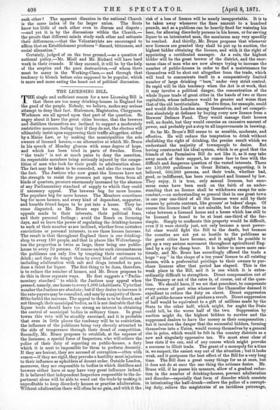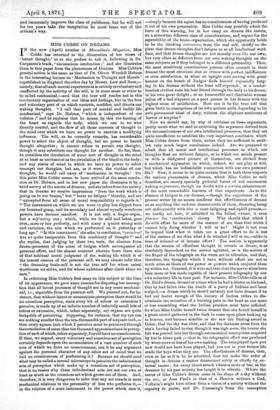THE LICENSING BILL.
THE single and sufficient reason for a new Licensing Bill is that there are too many drinking-houses in England for the good of the people. Nobody, we believe, makes any serious attempt to deny that fact. Statesmen, Magistrates, Clergymen, Workmen are all agreed upon that part of the question. So angry about it have the great cities become, that the brewers and distillers themselves are inclined to support a moderately restrictive measure, feeling that if they do not, the electors will ultimately insist upon suppressing their traffic altogether, either by a Maine Law, or by making the municipalities the sole owners of licensed houses,—an alternative at which Mr. Bruce in his speech of Monday glances with some degree of hope, and which has been tried in parts of Sweden. Even " the trade " is not at much pains to deny the assertion, its respectable members being seriously injured by the compe- tition of men who look for their profit to adulteration alone. The fact may be taken to be conceded, and also the reason for the fact. The Justices who now grant the licences have not the strength to resist the pressure put upon them from all kinds of quarters, pressure enormously increased by the absence of any Parliamentary standard of supply to which they could
if necessary appeal. The brewers beg for more houses. The populace beg for more houses. The Members sometimes beg for more houses, and every kind of dependent, supporter, and humble friend hopes to be put into a house. They be- come disgusted, as Mr. Bruce says he was, with the appeals made to their interests, their political fears, and their personal feelings ; avoid the Bench on licensing days, and so leave the power of regulating the drinking-houses to such of their number as are inclined, whether from mistaken convictions or personal interests, to see those houses increase. The result is that throughout England there is one drinking- shop to every 180 people, and that in places like Wolverhamp- ton the proportion is twice as large, there being one public- house to every 70 persons. Of course under such circumstances the publicans can only live by tempting their customers to drink ; and they do tempt them by every kind of enticement, including adulteration with salt and drugs intended to pro- duce a thirst for liquor. The first thing to be done, therefore, is to reduce the number of houses, and Mr. Bruce proposes to
do this in three separate ways. He first suggests a "Parlia- mentary standard " to which the Justices may appeal when pressed, namely, one house to every 1,000 inhabitants. Up to that number the Justices are absolute ; but if they desire to increase it the rate-payers may be consulted, and mayby amajority of three- fifths forbid the increase. The appeal to them is to be direct, and not through their municipal bodies, as it is not desirable that the liquor trade should have too strong an interest in obtaining the control of municipal bodies in ordinary times. In great towns this veto will be steadily exercised, and it is probable that even in little places the tendency will be to restriction, the influence of the publicans being very cleverly attracted to the side of temperance through their dread of competition. Secondly, Mr. Bruce proposes to establish, at the expense of the licensees, a special force of Inspectors, who will relieve the police of their duty of reporting on public-houses, a duty which it is next to impossible for them to perform decently. If they are lenient, they are accused of corruption—often with reason—if they are rigid, they provoke a hostility most injurious to their influence as upholders of decent order. Outside London, moreover, they are responsible to bodies in which distillers and brewers either have or may have very great influence indeed. It is believed that independent Inspectors responsible to the de- partment alone will be able to weed out the trade by making it unprofitable to keep disorderly houses or practise adulteration. Without adulteration there will often be no gain, and with it the
risk of a loss of licence will be nearly insupportable. It is to be taken away whenever the fines amount to a hundred pounds, and as a publican can be heavily fined for watering his beer, for allowing disorderly persons in his house, or for serving liquor to an intoxicated man, the maximum may very speedily be reached. And thirdly, Mr. Bruce proposes that whenever new licences are granted they shall be put up to auction, the highest bidder obtaining the licence, and with it the right of appointing a certificated manager. As a rule, the highest bidder will be the great brewer of the district, and the enor- mous class of men who are now always trying to increase the number of public-houses in order to find a maintenance for themselves will be shut out altogether from the trade, which will tend to concentrate itself in a comparatively limited number of large drinking "bars," under very strict control. So rapid will be this tendency when the Act is at work, that it may involve a political danger, the concentration of the whole liquor trade of great cities in the hands of two or three capitalists, whose influence would be greater and worse than that of the old territorialists. Twelve firms, for example, could and would divide London among themselves, and set competi- tion absolutely at defiance by buying every new licence from a Brewers' Defence Fund. They would manage their houses well, no doubt, but they would exercise an excessive amount of power, and probably put a stop to all improvements in brewing.
So far Mr. Bruce's Bill seems to us sensible, moderate, and effective. He will reduce the temptation to drink without abolishing the right of drinking, the precise result which we understand the majority of townspeople to desire. But having constructed his ideal system, which is so good that the friends of the Permissive Bill do not like it, as it may take away much of their support, he comes face to face with the difficult and dangerous question of the vested interests. There are 150,000 publicans in Great Britain, supporting; it is believed, 600,000 persons, and their trade, whether bad, good, or indifferent, has been recognized and licensed by law. They enjoy, it is true, only annual licences, but enor- mous sums have been sunk on the faith of an under- standing that no licence shall be withdrawn except for mis- conduct,—an understanding so general that in one great town in one year one-third of all the licences were sold by their owners by private contract, like grocers' or bakers' shops. Of course the licence itself is not saleable, but the difference in value between a licensed house and a house which has still to be licensed is found to be at least one-third of the fee- simple. Simply to confiscate this property would be difficult, even if it were strictly just, not only because a most power- ful class would fight the Bill to the death, but because the counties are not yet so hostile to the publicans as the great cities have become, and it might be possible to get up a very serious movement throughout agricultural Eng, land by a cry for cheap beer. It is better to move more cau- tiously, and Mr. Bruce has accordingly offered the trade a huge " sop " in the shape of a ten years' licence to all existing houses, with a preferential privilege to their owners to pur- chase licences after that period has elapsed. This is the weak place in the Bill, and it is one which it is extra- ordinarily difficult to strengthen. Direct compensation out of the Treasury or out of the rates is, of course, out of the ques- tion. We should have, if we set that precedent, to compensate every owner of port wine whenever the Chancellor deemed it expedient to reduce the duty on claret. Direct suppression of all public-houses would produce a revolt. Direct suppression of half would be equivalent to a gift of millions made by the State to the other half, which might, for aught the State could tell, be the worse half of the two. Suppression by auction might do, the highest bidders to survive and the suppressed dealers to have the money as their compensation ; but it involves the danger that the successful bidders, forming themselves into a Union, would recoup themselves by a general rise in price, which would be felt in the country districts as a new and singularly oppressive tax. We must steer clear of beer riots if we can, and of any course which might provoke a recourse to illicit trade. The grant of a monopoly for a time is, we suspect, the easiest way out of the situation ; but it looks weak, and it postpones the best effect of the Bill for a very long time. The Bill does a great many things for us at once, but it does not do at once the one thing the artizans desire. Mr. Bruce will, if he passes his measure, allow of a gradual reduc- tion in the number of drinking-houses, prevent adulteration and disorder—especially that form of disorder which consists in intoxicating the half-drunk—relieve the police of a corrupt- ing duty, relieve the magistrates of an invidious patronage, and immensely improve the class of publicans, but he will not for ten years take the temptation he most fears out of the artizan'a way.



































 Previous page
Previous page